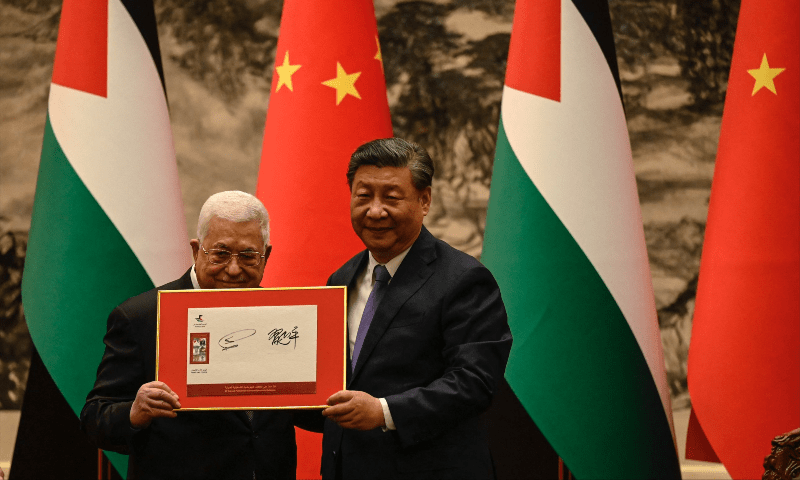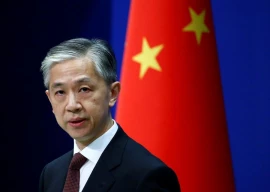
Chinese President Xi Jinping said on Wednesday that his country was establishing “strategic” relations with Palestinians ahead of talks with leader Mahmud Abbas in Beijing.
Abbas will be in the Chinese capital until Friday, Beijing has said, on his fifth official visit to the world’s second-largest economy.
“Facing a century of global changes and new developments to the situation in the Middle East, China is ready to strengthen coordination and cooperation with the Palestinian side,” said Xi during a welcome ceremony at the Great Hall of the People.
“Today, we will jointly announce the establishment of a China-Palestine strategic partnership, which will be an important milestone in the history of bilateral relations,” added Xi.
China stands ready to strengthen coordination and cooperation with Palestine, and work for a comprehensive, just and durable solution of the Palestinian question at an early date. China will work with Palestine to advance bilateral friendship and cooperation in all areas.
— Hua Chunying 华春莹 (@SpokespersonCHN) June 14, 2023
Abbas arrived in Beijing on Monday to hold talks with top Chinese leaders including President Xi and Premier Li Qiang.
President of the State of #Palestine Mahmoud Abbas arrived in #Beijing on Tuesday, starting a four-day state visit to China. pic.twitter.com/p7AWZprXpX
— China News 中国新闻网 (@Echinanews) June 13, 2023
Beijing has sought to boost its ties in the Middle East, challenging US influence — efforts that have sparked unease in Washington.
Also read: China backs Pakistan paying Russia in RMB
During a regular press briefing last week, Chinese foreign ministry spokesperson Wang Wenbin called long-time Palestinian leader Abbas an “old and good friend of the Chinese people”.
Last December, President Xi visited Saudi Arabia on an Arab outreach trip that also saw him meet with Abbas and pledge to “work for an early, just and durable solution to the Palestinian issue”.
Beijing has since positioned itself as a mediator in the Middle East, brokering the restoration of ties in March between Iran and Saudi Arabia — rivals in a region where the United States has for decades been the main powerbroker.
But finding a lasting solution to Israeli-Palestinian tensions may prove more elusive, as peace negotiations between the two sides have been stalled since 2014.
In April, Chinese Foreign Minister Qin Gang told his Israeli and Palestinian counterparts that his country was willing to aid peace negotiations, Xinhua reported.
And Qin told Palestinian foreign minister Riyad Al-Maliki that Beijing supports the resumption of talks as soon as possible, according to the state news agency.
In both calls, Qin emphasised China’s push for peace talks on the basis of implementing a “two-state solution”.



1722415155-0/BeFunky-collage-(18)1722415155-0-165x106.webp)
1717051338-0/BeFunky-collage-(76)1717051338-0-165x106.webp)
1731996868-0/Untitled-design-(7)1731996868-0-270x192.webp)














COMMENTS (3)
Comments are moderated and generally will be posted if they are on-topic and not abusive.
For more information, please see our Comments FAQ